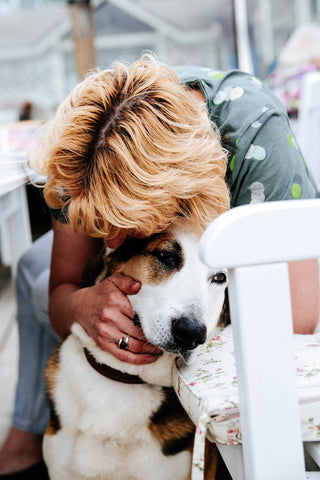Grieving The Loss of A Pet & Learning How To Cope
Share
A pet becomes a cherished member of your family, a best friend, and a constant companion in our lives. When a beloved family pet passes away, it’s natural to have deep feelings of heartbreak and sorrow. A strong bond of unconditional love between you and your pet was formed, so it’s important to acknowledge that it’s okay to grieve your pet’s death, (even if friends or family don’t understand your pain). Your feelings of sorrow are valid and many pet owners have experienced these same feelings. Knowing that it’s okay to mourn your pet is the first critical step towards coping with their loss.

After a pet’s death, you and your family members can experience intense feelings of overwhelming grief. The mourning process is different for every person and there is no timeline for how long it can last.Working through the variety of emotions that will arise is essential to coping with your sadness. As you and your family mourn the loss of a pet, be patient and compassionate with yourself and them.
How Pet Loss Impacts Your Other Pets:
The death of a family pet can heavily impact your non-human family members in the home. Your dog or cat can too grieve the loss of your pet. During your grieving process, look out for any behavioral changes in your other pets. The loss of your pet’s presence and your grief can cause different reactions from your pets. Some pets may not have any changes in behavior, while some may develop signs of grief such as:
- Changes in their appetite or eating habits
- Losing interest in family members; this includes hiding or avoiding them
- Changes in their bathroom habits
- Becoming withdrawn
- Changes in their sleeping patterns
- Changes in their personality; your pet may require an increase in attention
- Crying while looking for the lost pet in the home or when you leave
How Pet Loss Affects Veterinarians
Veterinarians are also deeply affected by pet loss. When a beloved pet has been diagnosed with an incurable or life-threatening condition or dies unexpectedly, it’s a sad and difficult situation for the veterinarian.
Losing pet patients can take an immense toll on your veterinarian.Despite their best efforts for caring and treating animals, a heartbreaking and saddening part of a veterinarian's profession is being confronted with a beloved pet’s death. Just as an owner builds a relationship with a pet over time, a veterinarian also forms a bond with their pet patients and owners.Due to pet loss being a painful aspect of their job, they too must cope with the death of their patients, the anticipated death of a pet, and owner bereavement. Whilst dealing with their own sadness over tragic events, a veterinarian’s role to the owner in this situation is to provide comfort and emotional support. A veterinarian will also provide pet parents with helpful grief information resources such as pet loss support groups, books, websites, brochures, or referring therapists. The empathetic and compassionate ways that a veterinarian responds to an owner may make a significant difference in the owner’s coping process.
Tips to Help You Cope With the Loss of a Pet:
The American Veterinary Medical Association gives fundamental advice to help guide grieving pet parents on their journey toward reconciling with the loss of a pet. During your mourning phase, the veterinary organization recommends pet owners to consider the following:
- Acknowledge the reality of the death
- Move toward the pain of the loss
- Continue your relationship through memories
- Adjust your self-identity
- Search for meaning
- Receive support from others
Here are additional tips to help your grieving process:
- Having a memorial service for your pet where you invite close friends or family to honor your pet’s memory.
- Joining a local or online pet bereavement support group
- Speaking with your friends, family, or someone who understands the relationship you had with your pet
- Create a physical of digital photo album of your pet
- Read informative books or resources that will help you understand the pain you’re feeling
Remember that it’s okay to mourn your pet. Your pet was a beloved companion and that special bond of unconditional love is powerful. Cherish all the memories you both created together and take your time to heal from the pain of your pet’s loss.
